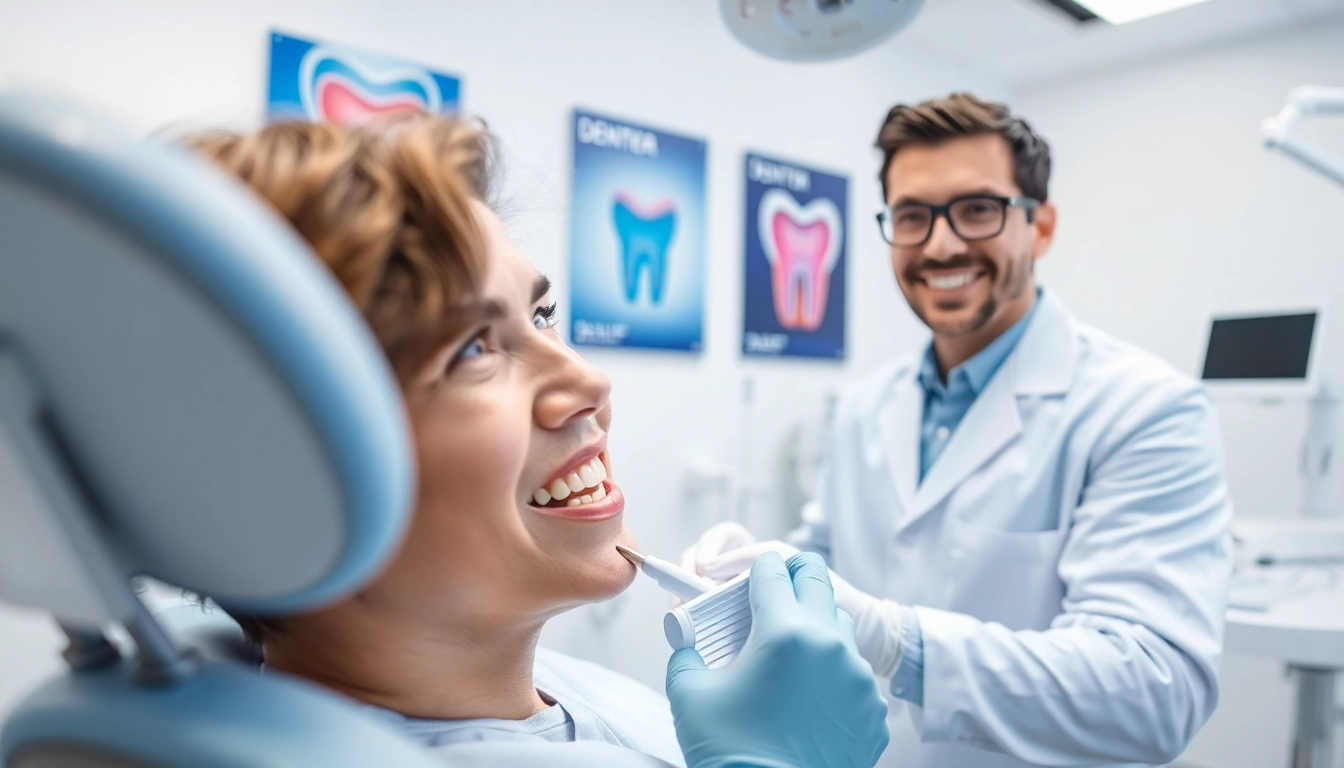Understanding the Importance of Regular Checkups
What are Dental Checkups?
Dental checkups are routine visits to a dentist designed to assess and maintain oral health. They typically involve an examination of your teeth and gums, professional cleaning, and preventive measures to keep dental issues at bay. Regular checkups are vital for not just addressing existing dental problems but also preventing future issues from arising. These visits provide an opportunity for dental professionals to catch potential problems early, before they require extensive and costly treatments.
Benefits of Regular Dental Visits
There are numerous benefits associated with regular dental checkups. Some of the primary advantages include:
- Early Detection of Issues: During checkups, dentists can identify cavities, gum disease, or other problems in their early stages, allowing for easier and less expensive treatments.
- Professional Cleaning: Even with diligent brushing and flossing at home, plaque and tartar can build up over time. Regular professional cleaning helps remove this buildup, reducing the chance of gum disease and cavities.
- Oral Cancer Screenings: Dentists often conduct screenings for oral cancer during checkups, an essential measure for early detection of this serious condition.
- Personalized Oral Health Advice: Each visit allows your dentist to provide advice tailored to your specific oral health needs, helping you maintain optimal dental hygiene at home.
Common Misconceptions About Checkups
Despite the clear benefits, several misconceptions about dental checkups exist. Some people believe that:
- Checkups are only necessary when experiencing pain: Many dental issues, like early cavities or gum disease, may not present noticeable symptoms. Regular checkups can help catch these issues before they become painful.
- Brushing is enough: While routine brushing is critical for dental health, it cannot replace professional cleanings or examinations.
- Only adults need checkups: Kids, teens, and even toddlers should have regular dental visits to ensure proper oral development and to instill good habits early on.
What Happens During a Dental Checkup?
Initial Examination and Assessment
Your dental checkup typically begins with a thorough examination of your mouth. The dentist will check for cavities, gum conditions, signs of oral cancer, and any other abnormalities. This may involve looking at your dental history, assessing previous treatments, and discussing any concerns you may have. The goal is to form a comprehensive view of your oral health.
Cleaning Process and Tools Used
After the examination, most dental checkups include a professional cleaning. This process consists of scaling, where dental hygienists use specialized tools to remove plaque and tartar from your teeth. Following scaling, polishing is performed using a high-powered electric toothbrush and a mildly abrasive toothpaste to leave your teeth smooth and shiny. Finally, your hygienist will floss between your teeth, ensuring that all areas are clean.
Diagnostic Procedures and X-Rays
Based on the assessment, your dentist may recommend further diagnostic procedures, including X-rays. X-rays allow the dentist to view the position of your teeth and detect any hidden problems that may not be visible during the visual examination. These images can reveal cavities between teeth, infected roots, or issues with your jawbone.
How Often Should You Schedule Checkups?
Recommended Frequency Based on Age
The general recommendation for dental checkups is every six months. However, this frequency may vary based on age and individual needs:
- Children: Children should typically visit the dentist by age one, with subsequent checkups every six months to monitor the development of their teeth.
- Adults: Most adults benefit from regular checkups every six months, although those with specific dental concerns may need to visit more frequently.
- Elderly: Older adults may require more regular checkups to address age-related dental issues.
Factors Influencing Frequency of Visits
Several factors may affect how often an individual should visit the dentist:
- Existing Dental Issues: Individuals with current dental problems may need more frequent checkups.
- Oral Hygiene Practices: Those who struggle with proper oral hygiene may need regular visits for professional guidance and cleaning.
- History of Dental Issues: A history of cavities or gum disease may necessitate more frequent monitoring.
Signs You Need an Urgent Checkup
While regular checkups are critical, there are signs that may indicate the need for an urgent visit:
- Persistent tooth pain or sensitivity
- Swollen gums or bleeding during brushing
- Chips or cracks in teeth
- Changes in bite or jaw alignment
Preparing for Your Dental Checkup
What to Expect at Your First Visit
If you’re visiting a dentist for the first time, it’s essential to be prepared. Typically, the first visit involves filling out forms about your medical history, previous dental experiences, and any concerns you have. Your dentist will combine this information with a comprehensive examination to determine your dental health.
Questions to Ask Your Dentist
Don’t hesitate to inquire during your appointment. Here are examples of questions you might consider asking:
- What can I do to improve my oral hygiene?
- Are there any specific dental issues I should be aware of?
- What treatment options do you recommend, and why?
How to Prepare Your Child for a Checkup
Preparing your child for their dental checkup can help ease anxiety. Here are some tips:
- Explain what will happen during the visit in a way they can understand.
- Role-play the visit at home, so they know what to expect.
- Use positive reinforcement, such as rewards, for good behavior after the appointment.
After the Checkup: Next Steps for Optimal Care
Understanding Your Dentist’s Recommendations
After your checkup, your dentist may provide a treatment plan or specific recommendations for maintaining your oral health. This could include dietary advice, suggested changes to your oral hygiene routine, or additional treatments that may be required. Understanding these recommendations is crucial for continued dental health.
Follow-Up Appointments and Treatments
If your dentist identifies any issues during the checkup, a follow-up appointment may be necessary. This is particularly important for treatments like fillings, crowns, or periodontal therapy. Adhering to these follow-up appointments ensures that any identified problems are handled promptly, preventing further complications.
Creating a Personal Dental Care Routine
Finally, post-checkup is the perfect time to assess and enhance your oral care routine. Aim to incorporate regular brushing, daily flossing, and mouthwash use into your regimen. Consider scheduling your next checkup in advance while your visit is fresh in your mind.



